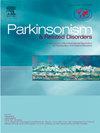由 230 名印度帕金森病患者组成的单一队列的遗传结构。
IF 3.1
3区 医学
Q2 CLINICAL NEUROLOGY
引用次数: 0
摘要
简介:印度帕金森病(PD)患者在遗传学研究中的代表性严重不足,人们对变异的频率及其对运动和非运动症状(NMS)的影响知之甚少:这项回顾性横断面研究针对在印度一家三级医院接受治疗的帕金森病患者。如果患者(i) 运动症状发病年龄(AAO)在 50 岁或 50 岁之前(EOPD),(ii) 有阳性帕金森病、帕金森病或肌张力障碍家族史,则建议他们进行基因检测。所有患者均接受了全外显子组测序,并确定了潜在的致病变异:230名患者(163名男性,占70.4%)的临床和遗传数据均已获得。在 47 名患者中发现了 35 个致病和可能致病的帕金森氏症基因变异,变异率为 20.4%。其余82名患者的变异意义不确定,或变异基因与帕金森病无关,101名患者没有任何非良性变异。基因介导的帕金森病患者的 AAO 值较低,肌张力障碍(36.2%)、姿势不稳定(29.8%)和情绪障碍(29.8%)的发生率较高,Hoehn 和 Yahr 评分(2.9)也较高。在 47 名患者中,11 人患有 PARK-PRKN,6 人患有 PARK-PLA2G6,22 人患有 PARK-GBA1:结论:约五分之一的早发型帕金森病可能有潜在的单基因病因。在印度,PARK-GBA1、PARK-PRKN 和 PARK-PLA2G6 是遗传介导型帕金森病的常见病因。有遗传病因的患者发病年龄较早,肌张力障碍、姿势不稳定和运动障碍的发病率较高。本文章由计算机程序翻译,如有差异,请以英文原文为准。
Genetic architecture of a single cohort of 230 Indian Parkinson's Disease patients
Introduction
Indian Parkinson's Disease (PD) patients are severely underrepresented in terms of genetic studies and little is known about the frequency of variants and their impact on motor and nonmotor symptoms (NMS).
Methods
This retrospective cross-sectional study was conducted in PD patients undergoing treatment at a tertiary care hospital from India. Patients were advised genetic testing if they had (i) age at onset (AAO) of motor symptoms at or before 50 years (EOPD), (ii) positive family history of PD, parkinsonism or dystonia. All patients underwent whole exome sequencing and potentially pathogenic variants were identified.
Results
Clinical and genetic data were available for 230 (163 males, 70.4 %) patients. Thirty-five pathogenic and likely pathogenic variants in various PD genes were identified in 47 patients resulting in a yield of 20.4 %. In the remaining, 82 patients had either variants of uncertain significance or had variants in genes not associated with parkinsonism and 101 patients did not have any non-benign variants. Patients with genetically mediated PD had a lower AAO and statistically greater frequency of dystonia (36.2 %), postural instability (29.8 %) and mood disorder (29.8 %) and a higher Hoehn and Yahr score (2.9). Among the 47 patients, 11 patients had PARK-PRKN, six patients had PARK-PLA2G6, and 22 patients had PARK-GBA1.
Conclusion
Around one-fifth of early-onset PD can have an underlying monogenetic cause. PARK-GBA1, PARK-PRKN and PARK-PLA2G6 are the commoner causes of genetically mediated PD in India. Patients with genetic cause had an earlier age at onset, and more frequent dystonia, postural instability and dyskinesia.
求助全文
通过发布文献求助,成功后即可免费获取论文全文。
去求助
来源期刊

Parkinsonism & related disorders
医学-临床神经学
CiteScore
6.20
自引率
4.90%
发文量
292
审稿时长
39 days
期刊介绍:
Parkinsonism & Related Disorders publishes the results of basic and clinical research contributing to the understanding, diagnosis and treatment of all neurodegenerative syndromes in which Parkinsonism, Essential Tremor or related movement disorders may be a feature. Regular features will include: Review Articles, Point of View articles, Full-length Articles, Short Communications, Case Reports and Letter to the Editor.
 求助内容:
求助内容: 应助结果提醒方式:
应助结果提醒方式:


